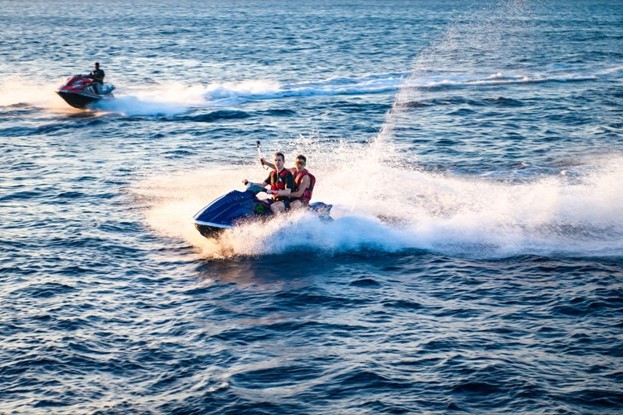The Boat Stop is temporarily pausing operation and is no longer accepting any new transactions.

Are you looking for a summer getaway that
will let you enjoy the sun and the water? If so, then a personal watercraft
might be the perfect solution for you! Personal watercrafts are a great way to
have fun on the lake or the ocean, and they are perfect for people of all ages.
However, although these vehicles seem
like nothing more than some harmless fun, they can be just as dangerous as any
other boat! Let's discuss why this is, what you need to know about it, and
finally what safety precautions you can take to ensure a fun time on the water!
Personal watercrafts, also known as
pleasure crafts or PWCs, are a type of small boat that is typically designed
for one or two people. These boats are usually propelled by a jet of water that
is created by the vehicle itself, and they are often used for recreation or
racing purposes. Some PWCs are designed in sit-down style, having space for
riders to truly sit on the vehicle. However, others feature a stand-in design,
which limits you to solely standing while riding the craft. What clearly
distinguishes all PWCs from most other boats, however, is that the persons who
are riding are intended to be sitting or standing on the craft — not inside the confines of the hull.
Despite that key difference, it's worth
noting that most regulatory bodies still consider PWCs to qualify as true
boats, which means any rider is required to comply with all traditional safety
guidelines. That means keeping a life jacket, fire extinguisher and all other
mandatory safety equipment that is required in your area on board at all times.
This safety regulation is primarily because, although personal watercrafts can
be great fun, they can also be very dangerous if they are not used properly! In
fact, statistics show that these types of boats are involved in more accidents
than any other type of vessel on the water.
This is likely due to the fact that
personal watercrafts are much smaller and less stable than other types of
boats, which makes them more difficult to control. Additionally, many PWCs can
reach speeds of up to 60 miles per hour, which can make it tough to stop or
slow down in an emergency situation. Finally, another danger of personal
watercraft is that they can easily capsize. Because they are so lightweight,
they can easily be overturned by waves or wind.
Because of these dangers, it's important
to always use caution when operating a personal watercraft, and to be aware of
the risks before you even get on board. The last thing anyone wants is to ruin
a great day of jet skiing with a tragic injury! Here are some high level tips
you can follow to make sure that never happens.
●
Know your vehicle
The first piece of advice we have for you
is to know your vehicle inside and out! Just like driving a car, understanding
the basic operational guidelines of your PWC can be a life-saver. You'll know
the right way to make a sharp turn or brake at high speed. Take some time to
read your owner's manual, or maybe even enroll in a boater's course.
●
Keep a safety kit handy
Next, consider storing a personal
watercraft safety kit on board. These are specially designed for PWCs specifically
and are stocked to carry any essential safety item you might need.
●
Avoid areas with high traffic or
bad weather conditions
Riding your PWC in either of these
situations is high risk, and can increase your chances of being involved in an
accident. It's harder to see, and more difficult to navigate. Our advice is to
just steer clear!
●
Maintain your craft
Finally, always make sure you're keeping
your PWC in top condition. Before you go for a ride, check the engine oil
levels of your vehicle, flush the intake and cooling systems, and do a quick
visual scan for any damage!
Personal watercrafts can be a boatload of
fun - literally! However, they also come with their own unique set of
precautions and regulations that boaters should always follow. Keep your vessel
in accordance with local guidelines, and follow the safety tips that we've
outlined in this article to maximize your PWC experience!
Further, if you're on the market for your
own PWC, check out The Boat Stop! Our holistic marketplace
connects boat sellers with perfect buyers to facilitate clean, end to end
transactions! With a wide collection catering to all types of boaters, we're
certain you'll find a PWC that you love.